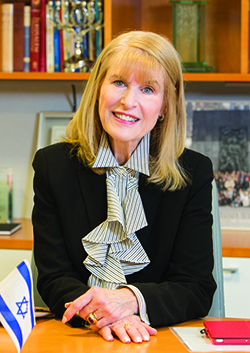Hadassah
President's Column
Summer Song

Life plays tricks on us, tricks in which we are willing accomplices. Children often resent rules they didn’t make and look forward to the freedom of adulthood—even though as adults they may wrestle with the burdens of responsibility and long for the innocence of youth.
One of the undeniable perks of childhood is summer recess, the carefree interval when liberty reigns, when fun lies in the freedom of camp, vacation and no homework. Some say the modern idea of summer vacation is a throwback to pre-industrial society, when closing school allowed children to help on the family farm. Whatever its origin, in our day and age, the summer break may be an example of educational function adapting to form.
Children rarely conspire in the tricks that life plays on adults. But since parents are themselves former kids, we have an advantage—all the more so when we can call on the millennia of tradition in which we are rooted. Practice has encoded striving for success not only into how we mold our children’s schooling, but also how we can influence their down time—through Jewish enrichment in camp, family vacations that include history and culture along with leisure, and summer learning activities that stress exploration over sedentary study.
Sometimes the kids catch on, and it’s exhilarating to watch them buy into and accelerate the process.
So pardon me while I kvell.
In August—after camp—my granddaughter Emily will begin her three-stop bat mitzvah. She’ll read from the Torah, first on Masada—where her father celebrated his bar mitzvah—and then at Robinson’s Arch, the egalitarian platform at the Kotel in Jerusalem. She is doing things efficiently, reading on Monday and Thursday of the same week so she only has to learn one parsha—for now. It will be the week of Tisha B’Av, when we recall the destruction of the First and Second Temples. My husband, Joel, and I will be there with the family; the idea of Emily choosing to make her entry into adulthood in two venues that symbolically and tangibly connect ancient Israel and the reborn Jewish state fills us with pride and awe.
There’s just one problem with an American girl having a bat mitzvah in Israel: the many friends and extended family members who don’t get to participate. So Emily will have a third celebration in December in California—for which she is, indeed, learning another Torah portion.
Habits developed in youth typically extend into adulthood. The behaviors most of us try to nurture in our children include curiosity, generosity, hard work and love of learning. We also tend to carry with us a special attitude toward summer, as if adult life continued to promise a two-month vacation. Part of the reason comes from the children and grandchildren who are central to our plans and calendars. But the educated child within also tells us that summer is a season with its own rhythm, when we remain active and keep growing in a more laid-back environment.
For Hadassah, summer is when we hold our National Assembly and Convention to assess our work, develop strategies and formulate plans for the year to come. Like good campers, we mix stimulating panels and lectures with fun activities. Like kids freed from the school-year routine, we also meet with new and old friends we don’t typically see during the colder months, giving us a fresh perspective on our work and priorities.
Life has always been complicated, and the modern world requires frequent adaptation. Our tricks are, in truth, techniques for inspiring ourselves and the next generation to do what is needed to build a better future—and to recover what is precious from the past.
The Jewish people have faced many changes in the past century, and we’ve been able to adapt—indeed, survive—because of the habits of the mind and spirit as well as the dedication our foremothers and fathers passed along.










 Facebook
Facebook Instagram
Instagram Twitter
Twitter
Leave a Reply